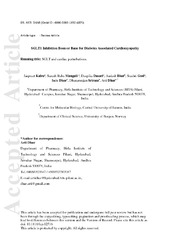SGLT1 inhibition boon or bane for diabetes-associated cardiomyopathy
Kalra, Jaspreet; Mangali, Suresh Babu; Dasari, Deepika; Bhat, Audesh; Goyal, Srashti; Dhar, Indu; Sriram, Dharamrajan; Dhar, Arti
Peer reviewed, Journal article
Accepted version
Permanent lenke
https://hdl.handle.net/1956/22089Utgivelsesdato
2020Metadata
Vis full innførselSamlinger
Originalversjon
Fundamental & Clinical Pharmacology. 2020;34(2):173-188 https://doi.org/10.1111/fcp.12516Sammendrag
Chronic hyperglycaemia is a peculiar feature of diabetes mellitus (DM). Sequential metabolic abnormalities accompanying glucotoxicity are some of its implications. Glucotoxicity most likely corresponds to the vascular intricacy and metabolic alterations, such as increased oxidation of free fatty acids and reduced glucose oxidation. More than half of those with diabetes also develop cardiac abnormalities due to unknown causes, posing a major threat to the currently available marketed preparations which are being used for treating these cardiac complications. Even though impairment in cardiac functioning is the principal cause of death in individuals with type 2 diabetes (T2D), reducing plasma glucose levels has little effect on cardiovascular disease (CVD) risk. In vitro and in vivo studies have demonstrated that inhibitors of sodium glucose transporter (SGLT) represent a putative therapeutic intervention for these pathological conditions. Several clinical trials have reported the efficacy of SGLT inhibitors as a novel and potent antidiabetic agent which along with its antihyperglycaemic activity possesses the potential of effectively treating its associated cardiac abnormalities. Thus, hereby, the present review highlights the role of SGLT inhibitors as a successful drug candidate for correcting the shifts in deregulation of cardiac energy substrate metabolism together with its role in treating diabetes‐related cardiac perturbations.
